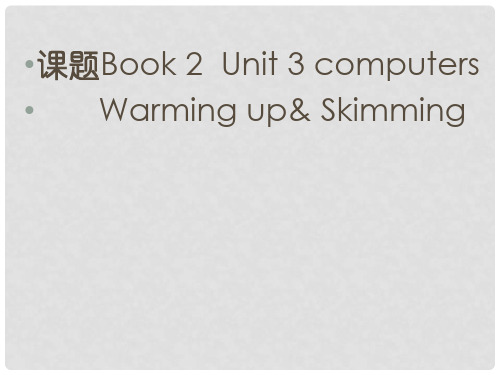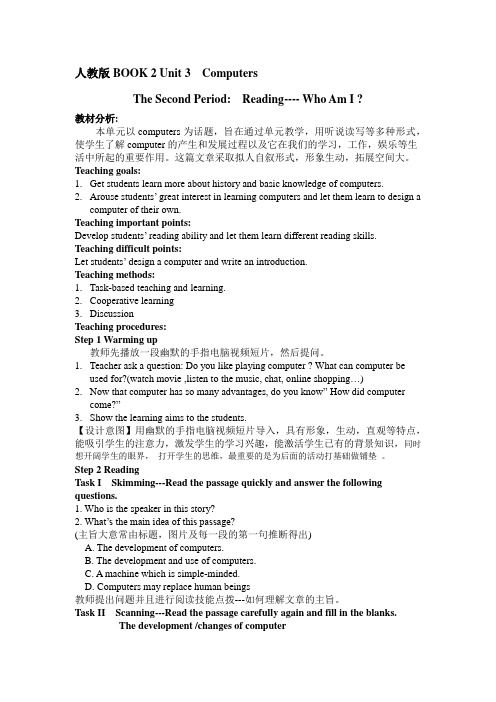Book2 Unit 3 P4作课
- 格式:ppt
- 大小:626.50 KB
- 文档页数:38






人教版BOOK 2 Unit 3 ComputersThe Second Period: Reading---- Who Am I ?教材分析:本单元以computers为话题,旨在通过单元教学,用听说读写等多种形式,使学生了解computer的产生和发展过程以及它在我们的学习,工作,娱乐等生活中所起的重要作用。
这篇文章采取拟人自叙形式,形象生动,拓展空间大。
Teaching goals:1.Get students learn more about history and basic knowledge of computers.2.Arouse students’ great interest in learning computers and let them learn to design acomputer of their own.Teaching important points:Develop students’ reading ability and let them learn different reading skills. Teaching difficult points:Let students’ design a computer and write an introduction.Teaching methods:1.Task-based teaching and learning.2.Cooperative learning3.DiscussionTeaching procedures:Step 1 W arming up教师先播放一段幽默的手指电脑视频短片,然后提问。
1.Teacher ask a question: Do you like playing computer ? What can computer beused for?(watch movie ,listen to the music, chat, online shopping…)2.Now that computer has so many advantages, do you know” How did computercome?”3.Show the learning aims to the students.【设计意图】用幽默的手指电脑视频短片导入,具有形象,生动,直观等特点,能吸引学生的注意力,激发学生的学习兴趣,能激活学生已有的背景知识,同时想开阔学生的眼界,打开学生的思维,最重要的是为后面的活动打基础做铺垫。
英语必修二unit3教案【篇一:高中英语必修二第三单元reading教学设计】 12345【篇二:高一人教课标必修2unit3 computers全单元的教案】period 1 readingthe general idea of this period:this period includes warming up,reading and comprehending of unit 3.it introduces the history and development of computers.from this period the students will learn more about computers.meanwhile they can learn some reading strategies such as skimming and scanning.teaching aims:1.train the students’ reading ability.2.learn some useful words and expressions.3.learn more about computers.teaching important points:2.learn how to use some important words and phrases in this passage.teaching difficult points:1.how to help the students improve their reading ability and understand the passage better.2.learn how to use some important words and phrases in this passage.teaching methods:1.skimming the passage to get the general idea of the text.2.scanning to get the details from the passage.3.explanations and practice to help the students master some language points.4.discussion to help the students understand better what they’ve learned and to use the knowledge they’ve learned in this period.teaching aids:1.a tape recorder.2.a multimedia.teaching procedures:step 1 warming up1.greeting the students as usual.2.introduce the topic of computersshow the five pictures (an abacus,a huge computer,a calculator,a pc,a notebook computer)and get the students name them in english.through this task,students can have a general idea about what they are going to learn.besides,students are expected to have a discussion about what they have in common while looking at them.and they are required to use the given expressions in their discussion to express their ideas.t:boys and girls,today i am going to introduce some machines to you.now let’s see whether you c an name them in english correctly,and talk about them.now work together with your partners and try to find out what they have in common.two minutes late,five students are asked to talk about them in class.s1:an abacus is an old calculating machine used in china until now.s2:a huge computer is built to solve some mathematical problems.but,in my opinion,it is too big.s3:a calculator is a new calculating machine which can solve a large number mathematical problems.and i think it is very convenient to carry and use,so we often use it.s4:a pc is a personal computer,which can solve all kinds of problems and is widely used in offices,schools,shops,at homes,etc.now.s5:a notebook computer is a kind of useful computer which can be taken conveniently like a notebook.but i think it is too expensive.t:quite good.it seems that you are all quite familiar with these machines.but can you tell what they have in common?any volunteers?s6:let me try.i think they all calculate something.they candeal with some maths problems. s7:i believe that they are our good friends.with their help we can finish our work quickly. s8:the 21th century is the century of information technology.as middle school students,we should try to learn how to use computers.t:well,your opinions are all right.indeed,these machinesall can calculate something.what’s more,from the abacus to the notebook computer,there is a long way.but nowcomputers have already changed our lives greatly.but do you know more about computers and can you say something about how computers have changed our lives.step 2 pre-readingshow the questions on the screen.t:now,please have a discussion first,and then i’ll asksome students to report your work.after a few minutes.t:now,who would like to answer the firstquestion?volunteer!s9:i’ll have a try.i know that computers have developed from large machines.they have been made smaller and smaller,but work faster and faster.i really can’t imagine what they will belike and whether they can take the place of human beings inthe future.t:yes,this is really a big problem.i think you are allinterested in computers,you may go on studying computers,and perhaps one day you will design your own computers and become the masters of computers.ok!next question!s10:i think computers have changed our lives greatly.we use computers widely in our study,in our work.you are using the computer to teach us english,aren’t you?s11:in my opinion,in the modern society,using the computers means grasping a tool of controlling the world.we may communicate with each other from a very long distance.in short,we can not live freely without them.t:i agree with you.the computers are becoming more andmore important in our lives.but learning more about computersis also important,isn’t it?ok,let’s come to the reading passage “who am i”.step 3 readingtask 1.skim the passage for the general idea.t:boys and girls,you will be given two minutes to skim the passage and try to find out who “i” am and get the general idea of this passage.after two minutes.t:time is up.who would like to tell us who “i” am and give the general idea of the text to the class?volunteer!s12:of course,“i” am the computer.the passage is mainly about the history and development of computers.s13:the passage is also about the relationship of computers and humans.task 2.scan for the details.t:boys and girls,you will be given two more minutes to scan the passage and try to find out the answers to the following questions.let’s see who can find out the answers most quickly and correctly.1.where were you in 1642?2.what happened to you in 1822?3.what were you called in 1936?4.what did you get in the 1960s?5.what happened to you in the 1970s?t:have you finished?s14:i have.i was in france as a calculating machine in 1642.in 1822,i was built as an analytical machine by charles babbage.i was called “a universal machine” in 1936,as i could solve any mathematical problem. in the 1960s,i was given a family connected by a network,so that i could share information with others and we could talk to each other.in the 1970s,i was brought into people’s homes.t:you are so quick-minded that in such a short time you could find out all the answers to the questions.your mind really works like a computer!step 4 comprehendingtask 3.fill in the timeline to remember the facts.t:but can you memorize facts like a computer?i am afraid you can not.but let’s try to remember the facts in the passage by filing in the timeline on page 19,which,i am sure,will help you remember the facts easily.suggested answers:t:have you finished?if so,please check your answers yourself.i’m sure all of you have got them right.now you can retell the history of computers easily with the help of the timeline,can’t you?please have a try,boys and girls!step 5 homework1.recite the key sentences.2.prepare for learning about language.3.try to retell the text using about 100 words.step 6 the design of the writing on the blackboard unit 3 computers period 1the general idea of the text: questions 1.where were you in 1642? 2.what happened to you in 1822? 3.what were you called in 1936? 4.what did you get in the 1960s? 5.what happened to you in the 1970s?language points:1.in common/have... in common (with)...2.in one’s opinion3.deal with4.simple-minded5.“as” and “with”6.“there were times when... ”step 7 record after teachingperiod 2 learning about languagethe general idea of this period:this period includes revision of the text、learning about language.from this period the students will learn how to use some of the key words and expressions in the text and do some exercises for consolidation,and learn how to use the present perfect passive voice.teaching aims:1.help the students to learn to use some useful words and expressions.2.enable the students to learn how to use the present perfect passive voice.teaching important point:the use of the present perfect passive voice.teaching difficult points:how to master the usages of some important words and phrases and the present perfect passive voice.teaching methods:1.task-based learning.2.cooperative learning.3.explanation and practice.teaching aids:1.a tape recorder.2.a multimedia.teaching procedures:step 1 revisiont:boys and girls,in last period we learned something about the history and development of computers.now who would like to retell the text with the help of these figures?s1:let me try.in 1642,a calculating machine was used in france.then in 1922,the analytical machine was made by charles babbage.it could follow instructions from cards with holes.in 1936,alan turing,the real father of computers,wrote a book to describe how computers could be made to work and built a “universal machine” to solve any mathematical ter,people discovered the computer had “artificial intelligence”.in the 1960s,the computer got his new transistors.its size was totally changes at that time.and in the early 1960s,the first family of computers were connected to each other.in 1970s,computers have brought into people’s homes.now computers have been used by billions of people to deal with information and communicate with each other around the world by the internet.t:congratulations!you’ve done very well.now try to do the same to your partners,ok! step 2 words and expressionstask 1t:please turn to page 19 and finish discovering useful words and expressions.at first,look at ex.1.from the readingpassage,find the words and expressions with the following meanings.now,ten students will be asked to give thewords.who can?volunteers!check the answers together.task 2.t:well done.now please look at ex 2.and complete the passage with some of the words above.pay attention to the use and the forms of those words.the possible answers:network so thatwent by totally truly simple-minded anyway deal withtask 3t:please finish ex.3.look at the sentences on page 20.tick the right word.then some of you will be asked to read the sentences one by one.the possible answers:1.life totally changed when i went to university.2.i was amazed to find that i won the competition to design a new computer.3.the competition was so exciting that we cheered all evening.4.i was so excited at the thought of meeting yang liwei that i could not sleep.【篇三:人教版高中英语必修二第三单元教学设计】《多媒体课件制作与使用技术》课题:the olympic games姓名: mia dong 学号: 17 专业:英语班级: 4 课程名称:多媒体课件制作与使用技术学期:2012至 2013学年第二学期人教版高中英语必修二第三单元《the olympic games》教学设计mia dong 外语系 4班 17一、学情分析(一)学习者分析1、一般特征:学生基本上来自农村,英语水平参差不齐,学习压力大;学习策略与方法不合理,有的学生还不喜欢英语。